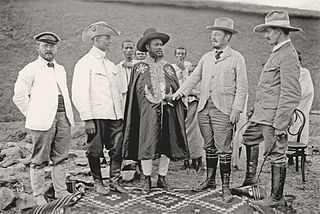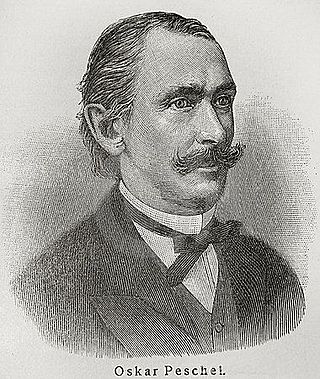
Wilhelm Scherer was a German philologist and historian of literature. He was known as a positivist because he based much of his work on "hypotheses on detailed historical research, and rooted every literary phenomenon in 'objective' historical or philological facts". His positivism is different due to his involvement with his nationalist goals. His major contribution to the movement was his speculation that culture cycled in a six-hundred-year period.

Heinrich Philipp Konrad Henke, German theologian, best known as a writer on church history, was born at Hehlen, Brunswick-Lüneburg. He was the father of historian Ernst Ludwig Theodor Henke (1804–1872).

Allgemeine Deutsche Biographie is one of the most important and comprehensive biographical reference works in the German language.

Neue Deutsche Biographie is a biographical reference work. It is the successor to the Allgemeine Deutsche Biographie. The 27 volumes published thus far cover more than 23,000 individuals and families who lived in the German language area (Sprachraum).
Arnold Otto Erich Brandenburg was a German historian.

Hermann Dessau was a German ancient historian and epigrapher. He is noted for a key work of textual criticism published in 1889 on the Historia Augusta, which uncovered reasons to believe that this surviving text of ancient Roman imperial history had been written under circumstances very different from those previously believed.
Hans Wilhelm Kirchhof was a German Landsknecht, Baroque poet and translator. He left a rich and versatile collection of works. The Ausläufer collections contain sixteen works. His printed and handwritten works number more than sixty.

Ludwig Richard Enno Littmann was a German orientalist.

Johannes Baptista von Albertini was a German botanist, mycologist and clergyman of the Moravian Church. He was born in the town of Neuwied.
KarlJohannAugustMüller was a German bryologist and science popularizer.
Stefan Clessin was a German malacologist.

Oscar Ferdinand Peschel was a German geographer and anthropologist.
Christian Heinrich Postel was a German jurist, epic poet and opera librettist, who wrote 28 libretti for the Oper am Gänsemarkt in Hamburg: set by composers such as Johann Philipp Förtsch, Reinhard Keiser and Georg Philipp Telemann. His texts for a St John Passion were set by composers Christian Ritter, Johann Mattheson and Johann Sebastian Bach in their respective St John Passion.

Johann Xaver Robert Caspary was a German botanist.
The Biographical Portal is a free online index to biographical reference works in the German language area. Intended to facilitate access to reliable biographical information, it contains entries for more than 160,000 biographies of persons from all social backgrounds and nearly all periods of German, Austrian, Swiss, Slovenian and South-East European history.
Karl Wilhelm Franz Brümmer was a German educator and lexicographer.
Siegfried Sudhaus was a German classical philologist, known for his scholarly treatment of Menander and Philodemus.

Max Bär was a German archivist and historian.
The Deutsche Biographische Enzyklopädie (DBE) is a biographical dictionary published by Walther Killy and Rudolf Vierhaus, the first edition of which was published from 1995 to 2003 in 13 volumes by K. G. Saur Verlag. Between 2005 and 2008 a second twelve-volume, revised and extended edition was published.










